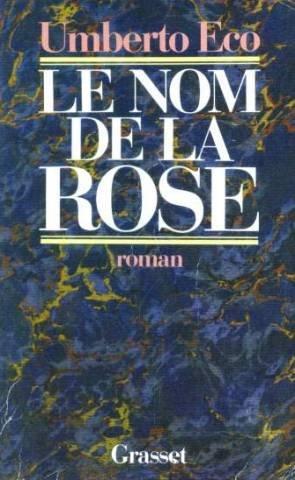marapavelka@books.theunseen.city reviewed Jméno růže by Umberto Eco
Review of 'Jméno růže' on 'Goodreads'
1 star
Hm, tak tohle ne. Film mám rád, ale knihu jsem dočíst nedokázal. Ta spousta keců okolo byla prostě k zbláznění nezáživná.

510 pages
French language
Published July 10, 1982 by Bernard Grasset.
Roman policier puisque la trame est une enquête menée durant sept jours, à l'intérieur d'un monastère, par Guillaume de Baskerville. Roman théologique en ce sens que toute l'argumentation recueillie par le jeune moine Adso relève des concepts aristotéliciens et thomistes. Roman historique car situé avec beaucoup d'érudition et de minutie en Italie en l'an 1327, à une époque troublée de complots et d'hérésies que fomentent les roitelets du Saint Empire et le pape d'Avignon. Mais plus que tout cela, en en conservant les charmes et l'agrément, un livre sur les livres tant la bibliothèque labyrinthique du monastère est le lieu d'où tout part et où tout revient. Elaborée comme une imaginaire fantaisie de Borges, l'intrigue savamment scandée au son trompeur des sept trompettes de l'Apocalypse est intelligemment menée par un Sherlock Holmes médiéval qui n'ignore rien de l'ésotérisme et du mysticisme. Un grand roman de 1980 dont l'exemplaire traduction préserve …
Roman policier puisque la trame est une enquête menée durant sept jours, à l'intérieur d'un monastère, par Guillaume de Baskerville. Roman théologique en ce sens que toute l'argumentation recueillie par le jeune moine Adso relève des concepts aristotéliciens et thomistes. Roman historique car situé avec beaucoup d'érudition et de minutie en Italie en l'an 1327, à une époque troublée de complots et d'hérésies que fomentent les roitelets du Saint Empire et le pape d'Avignon. Mais plus que tout cela, en en conservant les charmes et l'agrément, un livre sur les livres tant la bibliothèque labyrinthique du monastère est le lieu d'où tout part et où tout revient. Elaborée comme une imaginaire fantaisie de Borges, l'intrigue savamment scandée au son trompeur des sept trompettes de l'Apocalypse est intelligemment menée par un Sherlock Holmes médiéval qui n'ignore rien de l'ésotérisme et du mysticisme. Un grand roman de 1980 dont l'exemplaire traduction préserve une certaine manière de
Hm, tak tohle ne. Film mám rád, ale knihu jsem dočíst nedokázal. Ta spousta keců okolo byla prostě k zbláznění nezáživná.
A monk is asked to solve a series of murders in a remote 14th-century abbey amid a backdrop of high-level meetings between two opposing factions within the Catholic church.
This is my second time reading this novel. My first reading was well over 10 years ago, but that was before I discovered my recent interest in the Middle Ages. In addition to that, I also read a book earlier this summer specifically about monasteries and monastic living. With all of that under my belt, I decided to reread this book to see if I would still be impressed with it.
Perhaps not surprisingly, the mystery of the murders and of the library were much less intriguing the second time round. I think that's because there is little else to the novel other than that and the debates between the two opposing factions. A great novel, at its heart, still needs …
A monk is asked to solve a series of murders in a remote 14th-century abbey amid a backdrop of high-level meetings between two opposing factions within the Catholic church.
This is my second time reading this novel. My first reading was well over 10 years ago, but that was before I discovered my recent interest in the Middle Ages. In addition to that, I also read a book earlier this summer specifically about monasteries and monastic living. With all of that under my belt, I decided to reread this book to see if I would still be impressed with it.
Perhaps not surprisingly, the mystery of the murders and of the library were much less intriguing the second time round. I think that's because there is little else to the novel other than that and the debates between the two opposing factions. A great novel, at its heart, still needs well-developed characters and an engaging narrative. This novel lacks both. The narrative is detailed and very quotable, but it is not particularly beautiful; and there are even times when future disasters get telegraphed to the reader in an overt attempt to build suspense. As well, the main characters are distant and unrelatable, merely there to go through the motions. I didn't really care for or empathize with either of them. This is by far the biggest weakness I noticed on rereading it, and I suspect Umberto Eco was a better essayist than he was a novelist.
However, having said that, I do remember being completely absorbed with the plot and with the labyrinth in the library when I first read it. And, after doing all my reading on the Middle Ages, I'm even more impressed with Eco's ability to recreate the time and the place so well--not just the physical atmosphere, but the attitudes as well--and to communicate it so effectively.
It's a novel, primarily, about the control of information. It touches on matters of greed, nationalism, humility, faith, class, and power as well. However, Eco's primary purpose seems to be about censorship regarding some of the more controversial ideas held in certain books in the library. It's an interesting discussion, but I can't help but wonder if Eco would still have the same views if he had written this novel in the post-truth world we are now living in.
Despite certain reservations, I still recommend it. It is a bit self-indulgent at times when he is showing off his knowledge, particularly about obscure writers and monastic orders, but there is definitely intrigue in the dual mysteries of the library and the murders, as well as the wonderful atmosphere and history.